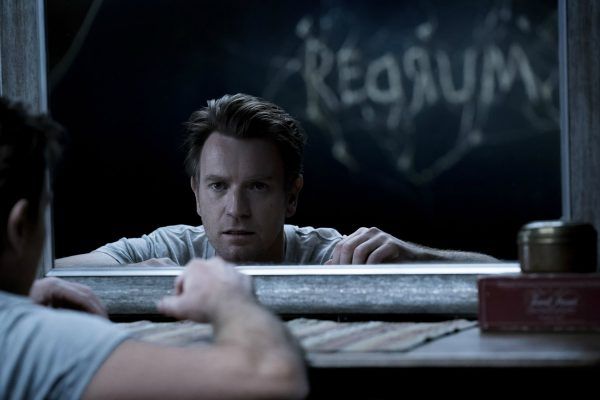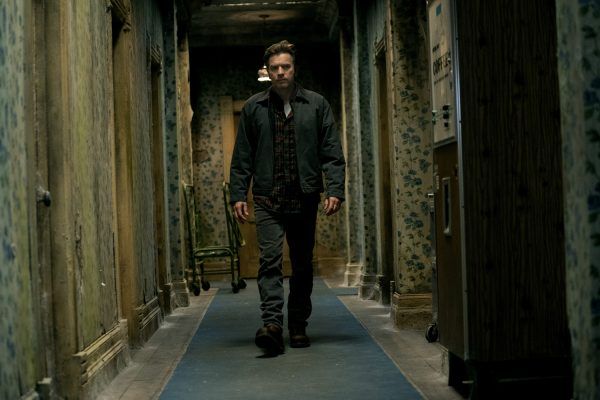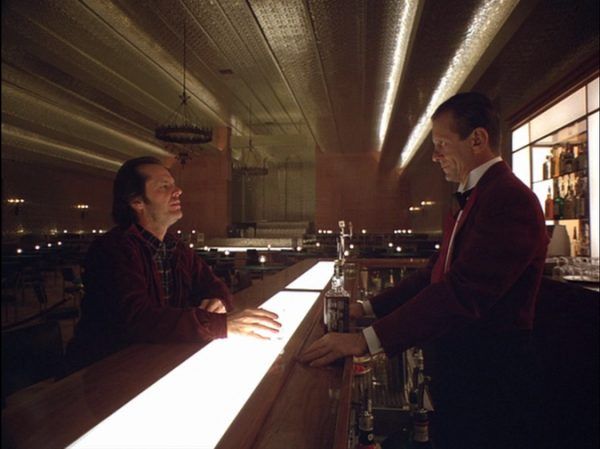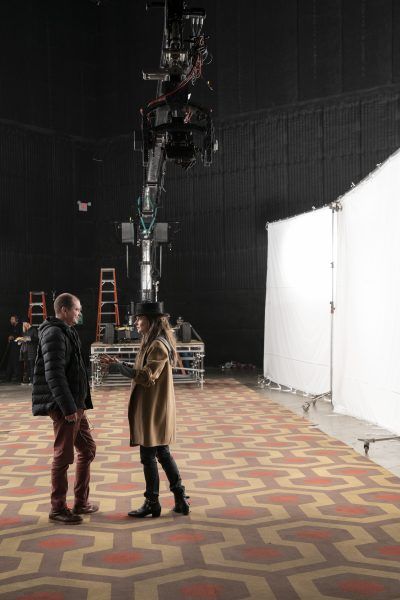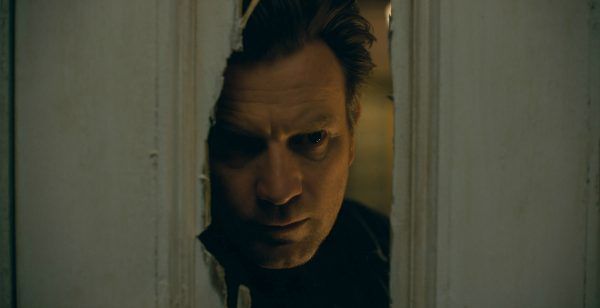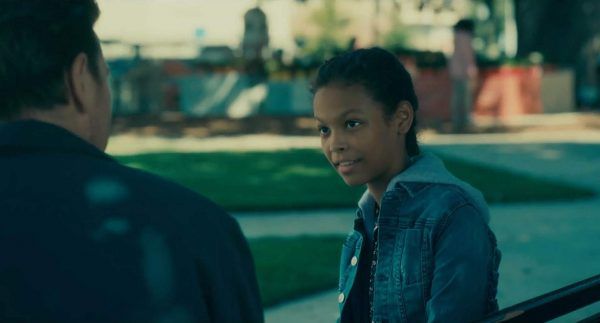Be aware there are full spoilers for Doctor Sleep below.
There's been a haunted hotel's worth of Stephen King adaptations over the years, but few filmmakers have a knack for tapping into King's signature blend of heart, guts and gore like writer/director Mike Flanagan and his longtime producing partner Trevor Macy.
The duo pulled off what was long considered impossible with 2017's Gerald's Game, turning a novel set primarily in the mind and memories of a woman handcuffed to a bed next to her husband's corpse into a jolting, emotionally wrenching cinematic experience. And it nailed the book's themes of trauma and survival while also delivering one of the all-time squirm-in-your-seat gross-out scenes with its infamous "degloving" scene. A perfect Kingian cocktail.
The duo is back at with Doctor Sleep, taking on another "impossible" adaptation in stride. An adaptation of King's 2013 sequel to The Shining that also serves as a sequel to Stanley Kubrick's 1980 film adaptation of The Shining, Doctor Sleep demanded that Flanagan and Macy thread a very small, very complicated needle to tie King and Kubrick's infamously different visions together.
But they also couldn't let the battling visions of the Overlook overtake the story of King's sequel, which follows a grown-up Danny Torrance (Ewan McGregor) through his recovery from addiction after following in his father's volatile footsteps and sends him on a terrifying new adventure with a young girl named Abra (Kyleigh Curran), who "shines" more powerfully than Danny ever did and winds up in the sights of a soul-sucking band of vampiric nomads called the True Knot.
Even if you put the film's legacy aside, Doctor Sleep is a beast of a book to adapt, packed with supporting characters, B-plots, and trips down memory lane to the horrific events of The Shining. That meant Flanagan and Macy had to do a lot of cutting and a lot of tweaking to King's original material, and book fans might have been surprised to see just how many bold strokes they took in their mission to bring King and Kubrick's worlds together.
But just because there were lots of changes, doesn't mean any of them were taken lightly. I recently had the opportunity to travel to the Stanley Hotel in Estes Park, Colorado, the supposedly haunted hotel where Stephen King had a nightmare that inspired The Shining and penned the book in the famed Room 217. While I was there, I spoke with Flanagan and Macy, and given the perfect setting for a proper nerd-out, I took the opportunity to break down the biggest Doctor Sleep book-to-movie differences, and how they balanced King and Kubrick's vision to make their movie.
Room 217 vs. Room 237
Everything, down to the room number on the hotel room in the Overlook was treated with intense attention to detail. It took them months to decide whether to go with Room 217, as it was in King's book or Room 237, the version filmgoers would be familiar with from Kubrick's adaptation. "I felt like the room number was planting a flag. That it's King or Kubrick, and I didn't want to do that," Flanagan explained." "But because we were doing flashbacks to the pristine hotel with little Danny, I had to make a decision," he continued. "And because everything else was in the Kubrick language, I felt like it had to be 237."
Even after the decision was made, they still managed to sneak Room 217 into the movie during one of Danny's hospice scenes. "I wanted to see Dan Torrance in front of those numbers somewhere. But that was a really tough call, because I felt like, whether we liked it or not, it was going to be kind of signaling to the audience which camp we were."
And that's just the small stuff, relatively speaking. When it came to paring down King's hefty novel to a feature-length film, there were lots of highlights that had to be cut. Danny and Billy's good buddy Dr. John barely pops up at all, Abra's kickass grandma Momo only gets a namedrop, and more than a few characters that survive the book are killed off to up the stakes and focus the story.
For Macy, it was especially hard to say goodbye to the B-plot that found the villainous True Knot slowly dying off from a plague. "I really liked The True not being sick, he said. "In the movie, we sort of played that as the scarcity of steam rather as the driving force motivating them, or at least motivating Rose and Crow cause the rest to them don't even really know. I loved the way that was executed in the book but it was several extra steps that we didn't feel you needed for the movie. That was hard to say goodbye to."
Jack Torrance and The Overlook
But the biggest changes come in the film's third act, when the action heads back to the Overlook Hotel, where Danny has to face down his demons and finish Rose the Hat for good. One demon, in particular -- his father Jack Torrance, originally played by Jack Nicholson and revived here with a performance by Flanagan regular Henry Thomas.
The figure of Jack Torrance was always going to be a tough one for them to get right for a number of reasons. Of course, there's the Jack Nicholson of it all and the intimidating presence of his celebrated performance. While Doctor Sleep also recast Wendy Torrance (Alex Essoe) and Dick Hallorann (Carl Lumbly), Jack Torrance provided the biggest challenge of them all.
Flanagan explained that he wasn't interested in doing the currently popular digital rendering, saying he doesn't think the technology is there yet to not be distracting, and more importantly, "it feels like a theft in a way," Flanagan explained. "I was trying to go for reverence and homage, not theft." That's why they opted to go for new performances.
Flannagan explained their approach "was finding actors who looked a little like their counterparts in The Shining, who reminded us of those characters, but who weren't doing impressions, and who weren't doing parody, and who were doing their own thing with the part. Who were playing Wendy Torrance and not playing Shelley Duvall, but who reminded me, who tilted me toward that character. And so the decision was, we can't have someone do a Jack Nicholson impression, it's going to be awful, it's going to be a farce and a caricature."
But that was just the casting element. When it came to the story, looming ever large was the fact that the character is so different King's book and Kubrick's film, which denied Jack his tragic arc, freezing him in a forever iconic vision of manic evil. By contrast, King's novel gave Jack a last-minute redemption that saw him fighting back against the hotel's forces just enough to save his family's life, and dying in an explosion that brought the hotel down after he failed to turn off the boilers. Which allowed King to bring Jack back as a friendly ghost in the Overlook, who aided Danny in his mission at just the right moment. Obviously, Flanagan's film had to do something different.
For that decision, Flanagan looked to Kubrick's film, which gave him the perfect answer to how to handle jack in the form of Delbert Grady, the former caretaker-turned-Lloyd the bartender, who always denied his former identity when Jack pushed him. Flanagan realized that he couldn't quite bring back Jack, but he could bring back Lloyd and still be right at home in the mythology. "So this isn't about finding an actor to play Jack and especially not to play Nicholson's Jack Torrance," Flanagan said. "This is about playing Lloyd the bartender. And we know that that's actually Jack Torrance. But Jack only comes out here and there in the tiniest little glimpses."
Ultimately, it's not Danny's dad that's he's facing down in that scene. It's not even the evil of the Overlook. Danny is squaring down his own demons at the gold room's bar, and Flanagan knew if he got that right, the scene would work. "The trick was, it couldn't have been about Jack, it couldn't have been about Nicholson, it couldn't have been about Kubrick," he explained. "That scene had to be about Dan, and it had to be about Dan having a conversation, not only with his father, but with his addiction. And as long as it was a conversation about his own demons and about his alcoholism, then I felt like we were okay."
The scene is really about Danny's emotional journey and its such an important cap on that emotional journey," Macy echoed. "That's the purpose in the story that it serves. So you really have to come at it from that point of view and then not doing anything inconsistent with the existing mythology."
Flanagan and Macy both agreed they wouldn't do the film if King didn't sign off on it and they worked with the author throughout the development of Doctor Sleep (as well as getting approval and resource access from the Kubrick estate.) But King originally didn't want the film to go back to the Overlook... until Flanagan pitched him that scene.
"That scene at the bar is the reason that Stephen King allowed us to go back to The Overlook. That was my pitch and he didn't want to do it," Flanagan explained. "He burned down the hotel, he didn't want to go back, and I said, 'But if you could just imagine, Dan walks through it alone, he gets to the bar, there's a drink waiting for him. The bartender, Lloyd, is pouring it for him. The bartender is his dad and they talk. Can you just imagine what that conversation would do.' And that's what made him give us his blessing to bring back the hotel."
Danny's Heroic Death
But there was another change that was a bit of a touch pitch -- in this version of Doctor Sleep, Danny dies at the end. In King's book, he lives to fight another day (as do Abra's father and Billy,) and when I asked if both he and King were OK with the idea of killing of Danny Torrance, Flannagan said, "He wasn't, I was." But if Danny was going to die, Flanagan knew he had to get it just right, and that decision gave him the means to finally bring King's original ending for The Shining to life. This time it's Danny who lights the boilers, and Danny who dies in the explosion that brings down the haunted hotel.
"Only under these specific circumstances, that was the only way it was going to feel okay for Danny to die," Flanagan said. "Because he got the ending that he, Steve, always wanted for Jack. And it was his ending of sacrifice and redemption that had been kind of pushed aside for this ending of madness that the Kubrick went for. I think if it had gone another way, if it was under other circumstances, I don't think either one of us would've been comfortable with it. But because we were kind of dovetailing back into his intended ending for The Shining, I think that made it okay."
"What happened to Jack in King's book kind of happens to Danny in our movie," Macy said. "And that was intentional because it's a really great thematic thing. Whether you look at it as the sins of the father visited on the son, or whether you look at or it as sometimes kids can do what their parents can't, it's a pretty powerful moment. So I think that was what won [King] over."
But since Danny died at the Overlook, does that mean the hotel holds on to a piece of his spirit? Flanagan has a much more optimistic outlook on the ending. "I think because you get to see that he's made it to New Hampshire, he visits Abra, I don't know that he's trapped," Flanagan explained. "He's certainly not trapped the way Jack is, in the way that Jack is part of the hotel, he's staff now, he's just the bartender. Danny isn't digested by the hotel the way Jack was, because it never won his soul the way it won Jack's soul in the Kubrick film.
He continued, "So in the same way that I love how Wendy can be there at the end for him, and in the same way that Dan can kind of appear to Abra throughout her life, the way Dick Hallorann did for him. I think that this world is a dream of a dream place that Hallorann talks about. I think it's all just cycles, but I don't think he's trapped in the hotel."
Danny and Abra's Bond
There was one more major shakeup in the film; it skipped one of King's biggest book reveals. In King's Doctor Sleep, "Uncle Danny" isn't just a nickname, it's a biological fact. As the book draws to a close, we learn that Abra's grandmother -- the aforementioned Momo -- had an affair with Jack Torrance. Her mother, who has a much more substantial role in the book, is Dan's half-sister, making Abra his niece. In the film, their connection is random.
"This was a very carefully constructed, and this is a good question because we spent a lot of time on this," Macy said. "Some people actually don't like that in the book that they're related. The thing we didn't like about it for the movie was -- I don't love the idea that just this one family shines. You know? In other words, like everybody wants to think they know somebody who shines or maybe they shine a little."
But that doesn't mean it's implicit in the film that they're not related, Flanagan and Macy made sure you could still take that reading if you wanted to. "Careful observers will note that if you want to imply that it was it's certainly possible within the framework of the movie," Macy continued. "I think it makes it too easy for Danny and Abra to relate if they find out they're related. And from a simple real estate point of view, it takes a lot of time to deal with that."
"I left it open for fans of the book," Flanagan agreed. "There was no reason why it couldn't be true or that the lineage wouldn't be that." But the director also echoed the sentiment that he didn't want the "shine" to feel like the trait of a bloodline, but something anyone could have.
"This is something I've seen argued about Star Wars too," Flanagan said, "I found the story to be more relatable if The Shining didn't feel proprietary to the Torrances. Particularly in the case of Abra, and I saw the stories of passing the baton to another generation. I liked that Abra and Dan's connection was more random, very similar to Dan and Dick Hallorann's." He continued, "While it's a cool part of book and fun for the fans, it felt like it's only Torrances that have this, it makes it less universal. So yeah, didn't want to contradict it, but I wasn't really interested in making it a major plot point because I like that Abra's just Abra and that Dan's just... I love that bit where it's just like, 'Why me?' And it's like, 'It's just because you're the one that answered the phone.' I mean that's basically it, that's life. And I liked that a lot."
For more on Doctor Sleep, read Matt's full review and watch our interview with scene-stealer Rebecca Ferguson.


